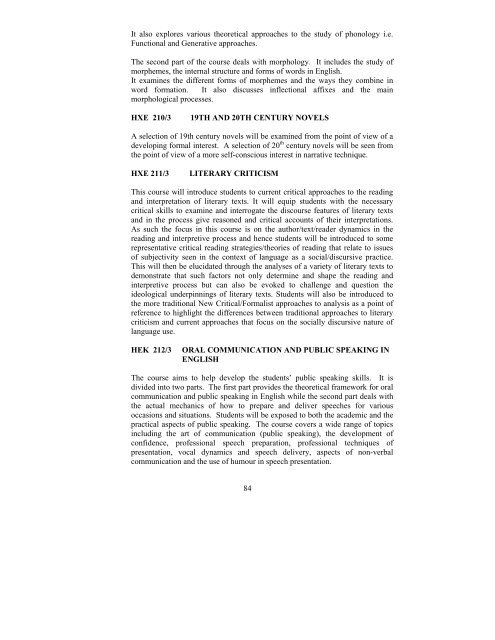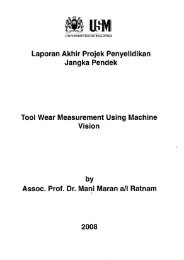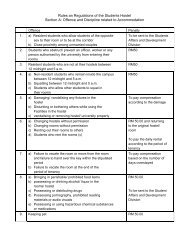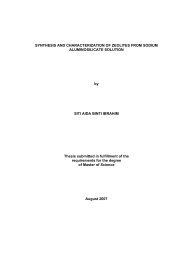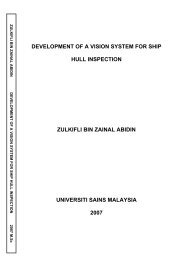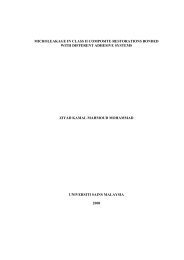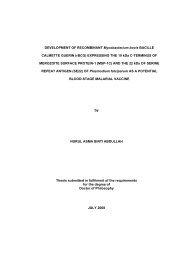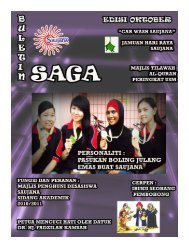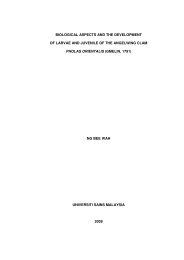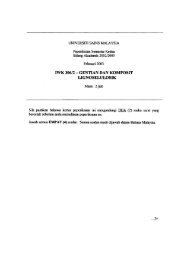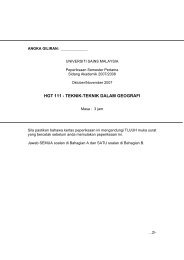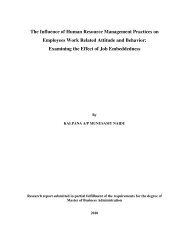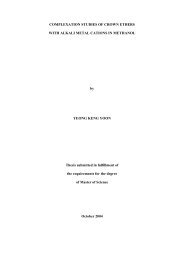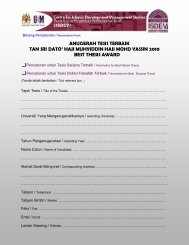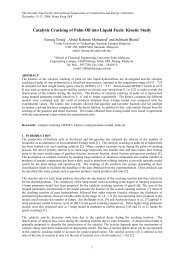IC/Passport Number - School of Humanities, USM
IC/Passport Number - School of Humanities, USM
IC/Passport Number - School of Humanities, USM
Create successful ePaper yourself
Turn your PDF publications into a flip-book with our unique Google optimized e-Paper software.
It also explores various theoretical approaches to the study <strong>of</strong> phonology i.e.<br />
Functional and Generative approaches.<br />
The second part <strong>of</strong> the course deals with morphology. It includes the study <strong>of</strong><br />
morphemes, the internal structure and forms <strong>of</strong> words in English.<br />
It examines the different forms <strong>of</strong> morphemes and the ways they combine in<br />
word formation. It also discusses inflectional affixes and the main<br />
morphological processes.<br />
HXE 210/3<br />
19TH AND 20TH CENTURY NOVELS<br />
A selection <strong>of</strong> 19th century novels will be examined from the point <strong>of</strong> view <strong>of</strong> a<br />
developing formal interest. A selection <strong>of</strong> 20 th century novels will be seen from<br />
the point <strong>of</strong> view <strong>of</strong> a more self-conscious interest in narrative technique.<br />
HXE 211/3<br />
LITERARY CRIT<strong>IC</strong>ISM<br />
This course will introduce students to current critical approaches to the reading<br />
and interpretation <strong>of</strong> literary texts. It will equip students with the necessary<br />
critical skills to examine and interrogate the discourse features <strong>of</strong> literary texts<br />
and in the process give reasoned and critical accounts <strong>of</strong> their interpretations.<br />
As such the focus in this course is on the author/text/reader dynamics in the<br />
reading and interpretive process and hence students will be introduced to some<br />
representative critical reading strategies/theories <strong>of</strong> reading that relate to issues<br />
<strong>of</strong> subjectivity seen in the context <strong>of</strong> language as a social/discursive practice.<br />
This will then be elucidated through the analyses <strong>of</strong> a variety <strong>of</strong> literary texts to<br />
demonstrate that such factors not only determine and shape the reading and<br />
interpretive process but can also be evoked to challenge and question the<br />
ideological underpinnings <strong>of</strong> literary texts. Students will also be introduced to<br />
the more traditional New Critical/Formalist approaches to analysis as a point <strong>of</strong><br />
reference to highlight the differences between traditional approaches to literary<br />
criticism and current approaches that focus on the socially discursive nature <strong>of</strong><br />
language use.<br />
HEK 212/3<br />
ORAL COMMUN<strong>IC</strong>ATION AND PUBL<strong>IC</strong> SPEAKING IN<br />
ENGLISH<br />
The course aims to help develop the students’ public speaking skills. It is<br />
divided into two parts. The first part provides the theoretical framework for oral<br />
communication and public speaking in English while the second part deals with<br />
the actual mechanics <strong>of</strong> how to prepare and deliver speeches for various<br />
occasions and situations. Students will be exposed to both the academic and the<br />
practical aspects <strong>of</strong> public speaking. The course covers a wide range <strong>of</strong> topics<br />
including the art <strong>of</strong> communication (public speaking), the development <strong>of</strong><br />
confidence, pr<strong>of</strong>essional speech preparation, pr<strong>of</strong>essional techniques <strong>of</strong><br />
presentation, vocal dynamics and speech delivery, aspects <strong>of</strong> non-verbal<br />
communication and the use <strong>of</strong> humour in speech presentation.<br />
84


